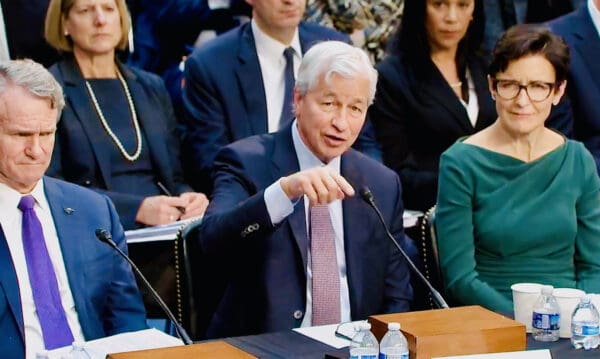This week, the Chief Executives of the largest banks in the United States visited with the US Senate Banking Committee for the Annual Oversight of Wall Street Firms. Much of the discussion revolved around the “Basel 3 End Game” (B3E) a new set of banking rules that US bankers are vehemently against due to the impact they will have on consumers and businesses without creating any additional benefits for the banking system. The designated compliance date for banks is July 2025 – so there is not too much time.
Jamie Dimon, CEO of JP Morgan Chase, and the most respected banker in the world, participated in the hearing, expressing his concerns about B3E – a sentiment that was echoed by all other banking executives. In brief, the new rules will are described as not improving the risk profile of the banks but will increase the cost of operation which will be passed on to customers.
Dimon said:
“Despite zero evidence that large U.S. banks are undercapitalized today, the proposed Basel III Endgame rule, if enacted, would unjustifiably and unnecessarily increase capital requirements by 20-25% for the largest banks. Banks would be limited in their ability to deploy capital in the times we’re most needed, and the rule will have a harmful ripple effect on the economy, markets, businesses of all sizes and American households. This rule will make services so uneconomical, you will likely see two outcomes: many banks will simply stop offering certain products and services, and those that do will have to charge more for them just to make it worth the service.”
Dimon said the US Federal Reserve has NOT studied the impact of B3E but Mortgages and small business loans will become more expensive, saving for retirement will be harder, consumer prices will rise and government and corporate projects will also rise in price. In effect it is a lose, lose.
No other bank executive disputed these expectations.
US Senator Sherrod Brown, the Chair of the Committee and a Democrat from Ohio, started the hearing by alluding to BS3 as being “common sense rules.”
“These rules protect against risky trading and derivative activities on Wall Street – the same activities that led to the 2008 financial crisis. They would close a loophole that allowed banks like SVB to hide behind an accounting fiction that lowered capital requirements and contributed to its failure,” said Brown.
Apparently, Brown does not understand that SVB [Silicon Valley Bank] and other banks suffered from interest rate risk and did not alter their portfolio during a time of fast-rising interest rates – and not due to an amorphous loophole. At the same time, the regulators (IE the Federal Reserve) were asleep at the wheel. It seems that Brown lives in an alternative universe, one where banks are all bad and all regulation is good.
The testimony is shared below and is worth a review.


